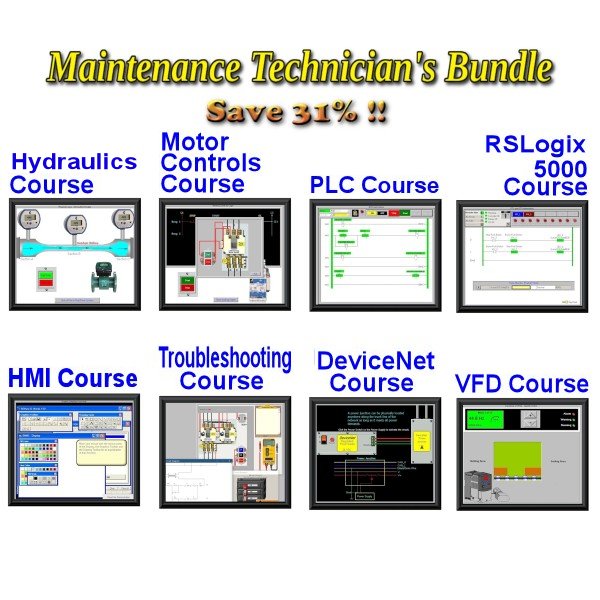
Instrument Technician NCCER Practice Test 1 Assessment
Instrument Technician NCCER Practice Test 1 :
These questions cover various topics needed for an Instrument Technician NCCER Level 1 certification.
Please consider our training while here ...

Also, check out The Maintenance Training Bundle to further your skills.
Instrument Technician NCCER Practice Test 1 test details:
( 20 Questions )
For those exploring a career as an instrumentation technician, the info below may help. The article will give newcomers a good sense of what do instrumentation technicians do.
Instrumentation Technician Skills & Knowledge - Level 1
Common areas where an entry-level instrumentation technician will need skill and knowledge.

Tools of the Trade
Entry-level industrial instrumentation technicians need to know the tools used at their level. For example, knowing when to use a torque wrench is essential. Techs tighten fasteners to the manufacturer’s specs. This helps prevent over-tightening, which can lead to equipment failure. Being skilled with a pipe bender helps technicians shape pipes to exact sizes and angles. Understanding the right angle and radius for bends is essential. Also, using a pressure gauge calibration kit is important. It helps keep pressure readings accurate. Technicians often use the voltmeter to troubleshoot and maintain instrumentation systems.
Fasteners and Anchors
In industrial instrumentation, knowing about fasteners and anchors is important. They ensure safety and structural strength. Technicians need to recognize different fasteners like bolts, screws, nuts, and washers. They should also know how to use each one. It's also essential to understand the difference between metric and standard sizes. Plus, understanding which materials work best in specific environments is important. Understanding different anchors, such as expansion and chemical anchors, keeps equipment safe. It also lowers operational stress. This knowledge helps during installations, repairs, or replacements of instruments. It lets technicians choose the correct fasteners and anchors for each task.
Gaskets and Packing
Knowing about gaskets and packing helps stop leaks. It also keeps piping systems and equipment running well. An entry-level technician should understand the different types of gaskets. These include rubber, metal, and fiber. They should know how to apply each type based on temperature and pressure needs. Knowing about packing materials for valves and pumps is key. They can greatly affect performance and maintenance time. Using gaskets and proper compression helps techs avoid leaks and mechanical problems. This way, equipment lasts longer, and systems work better.
Pumps and Drivers
Pumps and drivers are crucial components in many industrial processes. Entry-level technicians need to know how they work and how to maintain them. Knowing how centrifugal and positive displacement pumps operate is a must. Knowing how electric motors and hydraulic drives work with pumps is essential. This interaction impacts the system's efficiency and performance. Technicians handle basic maintenance tasks. They change seals and bearings. They troubleshoot common problems. This helps maintain efficient operations and minimizes downtime in industrial systems.
Valves
Valves play a crucial role in managing fluid flow in industrial systems. Understanding their types and functions is essential for instrumentation technicians. Entry-level technicians need to know different valve types. These include gate, globe, ball, and check valves. They also need to know how to use each type in a way that achieves its intended purpose. They should also learn to read valve specifications. This helps them choose the right valve for each job. They need to consider pressure, temperature, and fluid properties. Keeping valves in good shape is important. This means lubricating them and changing seals. Doing so helps systems run efficiently and stay safe.
Lubrication
Understanding lubrication practices is crucial for maintaining mechanical systems in good working order. Entry-level technicians should know about different lubricants. These include oils, greases, and specialty lubricants. Pick a lubricant based on temperature, load, and environment. Knowing where to lubricate machinery and when helps reduce wear on parts. Proper lubrication can make your equipment last longer. Technicians also need training in safe lubrication practices. Safe practices that help prevent accidents and protect the environment during maintenance tasks.
Oxyfuel Cutting
Oxyfuel cutting is common in industry. An entry-level technician needs training to ensure safe and effective use. To cut without risk, you must understand the principles of oxyfuel combustion. Set up your cutting equipment correctly. This way, you'll ensure the safe use of the oxygen and acetylene tanks. Technicians need to adjust flame settings based on material and thickness. Using the right flame settings helps cuts go smoothly. It also reduces the risk of damaging nearby structures. Knowing safety protocols is key. It helps prevent accidents and injuries during gas handling and cutting operations.
Craft-Related Mathematics
Craft-related mathematics is an essential skill for an entry-level instrumentation technician. You must be able to perform basic arithmetic, algebra, and geometry. Math helps us measure distances, calculate sizes, and understand pressure and temperature. It's essential for these tasks. Technicians need to know both metric and imperial systems. They will use them in their work. Ratios and proportions help technicians grasp flow rates and equipment outputs. This understanding is vital for system analysis and troubleshooting. Good math skills help technicians perform their jobs with greater effectiveness and precision.
Piping and Instrumentation Diagram (P&ID)
A Piping and Instrumentation Diagram (P&ID) is essential for industrial instrumentation technicians. It offers a clear visual of a facility's piping and instrumentation systems.
Entry-level techs need to recognize P&ID symbols for:
- Equipment
- Piping
- Valves
- Instruments
These diagrams are crucial for installation, maintenance, and troubleshooting. Before starting projects, they should check P&IDs. Checking diagrams first helps them find the right materials and tools for each task. Doing so also boosts efficiency and accuracy during implementation.
Test Instruments
Entry-level technicians must show skill in using test instruments. These tools are essential for monitoring and fixing systems. Technicians need to know different testing devices. These include multimeters, oscilloscopes, and pressure gauges. The tech uses the test equipment to calibrate, troubleshoot, and maintain it. Using test instruments helps technicians check system performance. It also allows them to spot any issues that need closer examination or repair.
Material Handling and Hand Rigging
Understanding material handling and hand rigging is key. It helps maintain safety for everyone and ensures efficient work on the job site. Entry-level technicians use proper lifting techniques. They know the hand tools and devices required for moving materials without risk. That knowledge helps avoid strain and reduces the risk of injury. Technicians use rigging gear such as slings, ropes, and hoists. They lift heavy tools and parts safely. This skill ensures accuracy in their work. Techs can lower accident risk by knowing load limits and using the right rigging methods. Proper handling of materials keeps technicians safe and helps them follow best practices.
Forklifts and Other Support Equipment
Entry-level industrial instrumentation technicians need to operate forklifts and other support tools. Training for safe froklift operating procedures is mandatory. Safety training on load handling, visibility, and maneuvering in different environments is crucial. Understanding forklift maintenance, pre-operation checks, and safety rules keeps the job site safe. Experience with scissor lifts and cherry pickers makes a technician more versatile. This helps them do their jobs better and manage more tasks in industrial settings.
The Maintenance Technician Training Bundle is a solid start for learning instrumentation. It also helps boost your career.
Industrial Intrumentation Technician FAQ:
What is an instrumentation technician?
An instrumentation technician installs, maintains, and repairs instruments and control systems that monitor and control industrial processes.
What do instrumentation technicians do?
Instrumentation technicians use tools like sensors, transmitters, and control systems. These help them get accurate measurements and keep processes running smoothly. They also troubleshoot and perform preventive maintenance. (Instrumentation Troubleshooting FAQ)
How much do instrumentation technicians make?
An instrumentation technician's salary can vary. It depends on experience, location, and industry. On average, they earn between $50,000 and $80,000 a year.
How to become an instrument repair technician?
To be an instrument repair technician, you usually need to:
- Finish an education program or apprenticeship.
- Get hands-on experience.
- Earn NCCER certifications in instrumentation and control systems.
What is a NCCER certification?
NCCER certification is a national credential. It shows a person's skills and knowledge in construction and maintenance trades. This includes areas like instrumentation technology. It is often sought after by employers to ensure a standardized level of training.
Here is a fun article that gives the reader a more detailed glimps into the world of instrumentation.
Electromagnetic Induction Applications For The Instrumentation Technician
Published:
